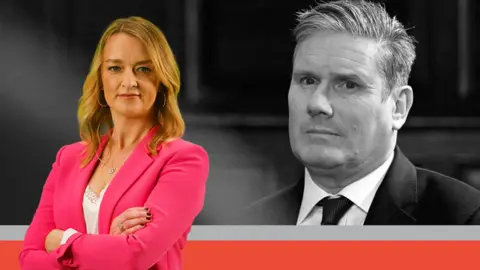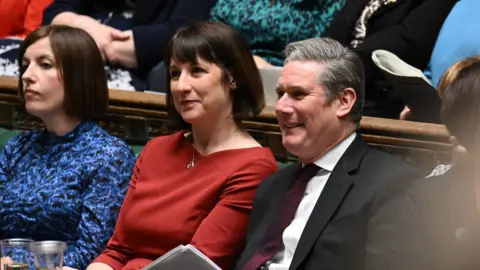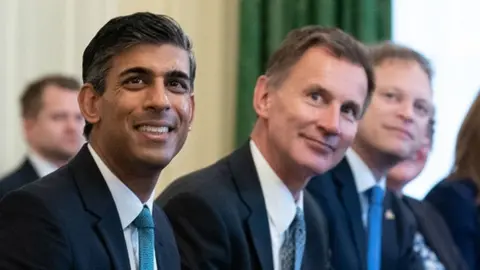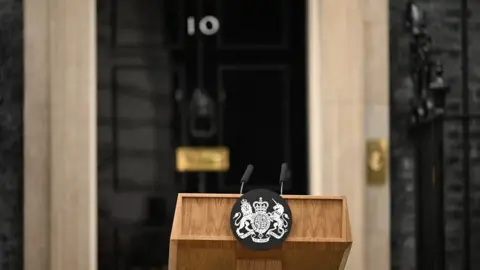Laura Kuenssberg: What could go wrong for Keir Starmer?
 BBC
BBCPreparation sessions for Prime Minister's Questions on Wednesday are a crucial couple of hours in the Westminster timetable.
The prime minister and the leader of the opposition sit down with their key advisers to try out attack lines and taunts, master the facts and, crucially, come up with some jokes.
Yes, politics is a profoundly serious business, but humour can be a deadly verbal weapon, and create a moment that will leap into the headlines.
And for opposition leaders, that chance to grab the country's attention is what PMQs is all about.
Sir Keir Starmer, publicly, is not exactly known for cracking gags.
His early performances at PMQs were not full of levity, one columnist joked back then that even a smile was a collector's item.
But now, more than three years into the job, after many months ahead in the polls, one of Sir Keir's confidants tells me he is coming up with more of his own jokes.
"He wouldn't accept 'I can't do humour'", they tell me, and now will increasingly suggest wisecracks rather than rely on others' lines.
It is a small, but revealing change in what insiders describe as his strict political regime, a sign of his growing ease, and "fiercely competitive" nature, a refusal ever to accept that he can't do things to get better at the job.
The Labour leader has good reason to be increasingly confident that he will one day walk through Number 10's shiny black door.
A lot has gone right since he took over back in spring 2020, a political lifetime ago.
A Labour source says his three phase plan - "fix the party, trash the Tories, then develop an offer" - has been "vindicated", recalling in the early days their many critics said he was "being too slow", or "trying to bounce us early" into making big decisions.
Solid poll lead
Remember too, when Sir Keir won the leadership there were warnings that Labour might even cease to exist.
They had been absolutely hammered in the 2019 election. There had been years of vicious infighting, and agonies over antisemitism.
By any measure, restoring the party to a credible political organisation is an enormous accomplishment.
Without question, Sir Keir has been helped by the Conservatives' rolling series of crises - the chaos of Boris Johnson's downfall, the market meltdown of Liz Truss' several dozens of days in office, and now the profound problems in the economy.
 UK Parliament/Jessica Taylor
UK Parliament/Jessica TaylorBut even with the much more ordered regime of Rishi Sunak, Labour has managed to stay significantly ahead in the polls, making important advances in local elections, and soon to be tested again in a flurry of by-elections you can read about here.
As a result of a solid and sustained opinion poll lead, Labour is thinking not just about how to win anymore, but in detail about what they would do if they get there.
'Scary as hell'
Sir Keir is the first to warn of complacency, repeatedly telling his team to fight "like they are five points behind".
But there is no question he is mulling over how he would govern.
"He is thinking, I want to be ready and I want to be a good prime minister," says an ally.
Another source tells me he is already using a red box system, like a prime minister would.
"Everything goes in by late afternoon with a hard deadline and he spends his evenings poring over papers, ideas, drafts, or submissions", all dealt with by the morning.
But it may be more than a year still until he has the chance to swap the bag that holds his papers for a real government red box. And there is still an awful lot that could go wrong.
Sensing the opportunity and worrying it could go south is "scary as hell", says a shadow minister.
There is a widespread awareness that Labour's massive lead now is likely to narrow as a general election comes closer.
The Tories "aren't dead", says one shadow minister and their party HQ has one of the most successful campaign fighting records in the Western world.
And the first rule of politics is always, learn to count.
 Getty Images
Getty ImagesA whopping national poll lead does not automatically translate into winning many more seats in a general election, as one Labour MP in a tightly-fought constituency worries - "The biggest danger is that you rack up big majorities and don't seal the deal with enough of the seats".
Sir Keir's team can't change the fact that Labour fell so far behind in 2019 that winning an overall majority isn't just climbing a mountain, more scaling the Himalayas. They also of course, like any political organisation, can't control unforeseen events that can shape how voters make decisions.

- On this week's show are Labour leader Sir Keir Starmer and Business Secretary Kemi Badenoch
- Watch live on BBC One and iPlayer from 09:00 BST on Sunday
- Follow latest updates in text and video on the BBC News website from 08:00

Not much however is without risk, even issues that ought to be within Starmer's control.
First, one source half jokes what could go wrong is "The Labour Party"!
The danger is "it loses discipline and focus and makes unforced errors", they tell me.
"It's been 20 years since we won a general election", they add, and the party simply doesn't have the habit.
A shadow minister says "we have to hold our nerve" and not make any mistakes, or give into pressure from the left of the party.
Battles with the left
The leadership has been accused of control freakery, trying to suppress the left, expelling party members unfairly.
But a source says the danger of disputes with the left is "way down the risk register", the focus has to be on potential voters.
One shadow minister believes Sir Keir thinks "I can't be in government and dependent on these people".
The logic goes that battles with the left over who gets to run as a Labour MP now are well worth having to avoid having an awkward squad that could make life difficult in Parliament later. Particularly if Labour has to try to run the country as a minority government or with a tiny majority.
 Getty Images
Getty ImagesThe leadership's most central strategy is one of the reasons why there are grumbles on the left - and that is risky too.
As we heard from Shadow Chancellor Rachel Reeves last week, and Sir Keir is likely to argue in our interview on Sunday morning, Labour has put watching the pennies strictly at the top of its list.
With the economy in serious trouble, they share some of the ethos of the current government, however uncomfortable that might feel, that now is not the time for huge spending or huge tax cuts.
'A bit shifty'
That discipline means the party has dropped or watered down some promises that activists loved - the plan for free university tuition in England, delaying big spending proposals for green projects.
No-one is getting promises from Rachel Reeves' cheque book, as we talked about last week.
It has had an effect on the leader's reputation.
One union leader says Starmer has "had the blame for shifts in policy that have made him look a bit shifty".
And there is concern that all the talk of keeping a lid on spending on what Keir Starmer once described as "good Labour things" will lead voters to wonder what Labour really would offer.
Another senior figure tells me: "The economy is on its knees - sitting there saying, we are very sensible, who is going to listen to that?"
There is also a question of the political argument being made.
Keir Starmer and his team have made the case for many years that the deep roots of many of the country's problems relate to the austerity of the coalition years, when George Osborne kept strict limits on spending.
But if Labour's plan does not include filling in the holes financially to undo that damage, does that stack up?
Tight grip
One of his MPs, not from the far left of the party, ponders "it is pretty hard to criticise this government without acknowledging the damage that austerity has caused, and then not say you would spend more… no-one really believes that he wouldn't spend more". As Labour approaches its National Policy Forum next week, an important powwow with activists and unions, calls for more ambition, like from the leader of the Unite union, Sharon Graham, may become familiar.
The leadership's answer?
Stressing the importance of reforming and improving public services, and getting the economy growing without spending billions extra and certainly not borrowing without good reason.
Labour's top team is stuck like glue to the idea that they have to show they would keep a tight grip on public spending, almost as if they are traumatised by past elections when the Conservatives have run the attack that they would splash the cash.
A senior figure suggests the leadership is "very nervous about making any wrong moves on the economy".
But those at the top believe the messiness of the past few months, particularly the rising cost of mortgages, make discipline even more important.
One shadow minister says: "The mortgage stuff hits homeowners in places like Stevenage and Luton, swing voters, who are looking for people who are serious on the economy."
But insiders acknowledge turning discipline into electoral excitement might not be easy. Making promises about abstract reform doesn't necessarily get voters running to the polling booths.
As Parliament packs up for the summer, there is no question that Sir Keir Starmer has cause to be confident. His party is well ahead, but risk is all around.
There are traps to avoid, big decisions to take, many thousands of miles of campaigning still to go.
With less time to play football, the Labour leader now tries to stay in a hotel with a gym, to run on a treadmill.
After more than three years in the job, even having clocked up many successes, he knows the journey to the job he craves in Number 10 is still a marathon, not a sprint.
Follow Laura on Twitter
